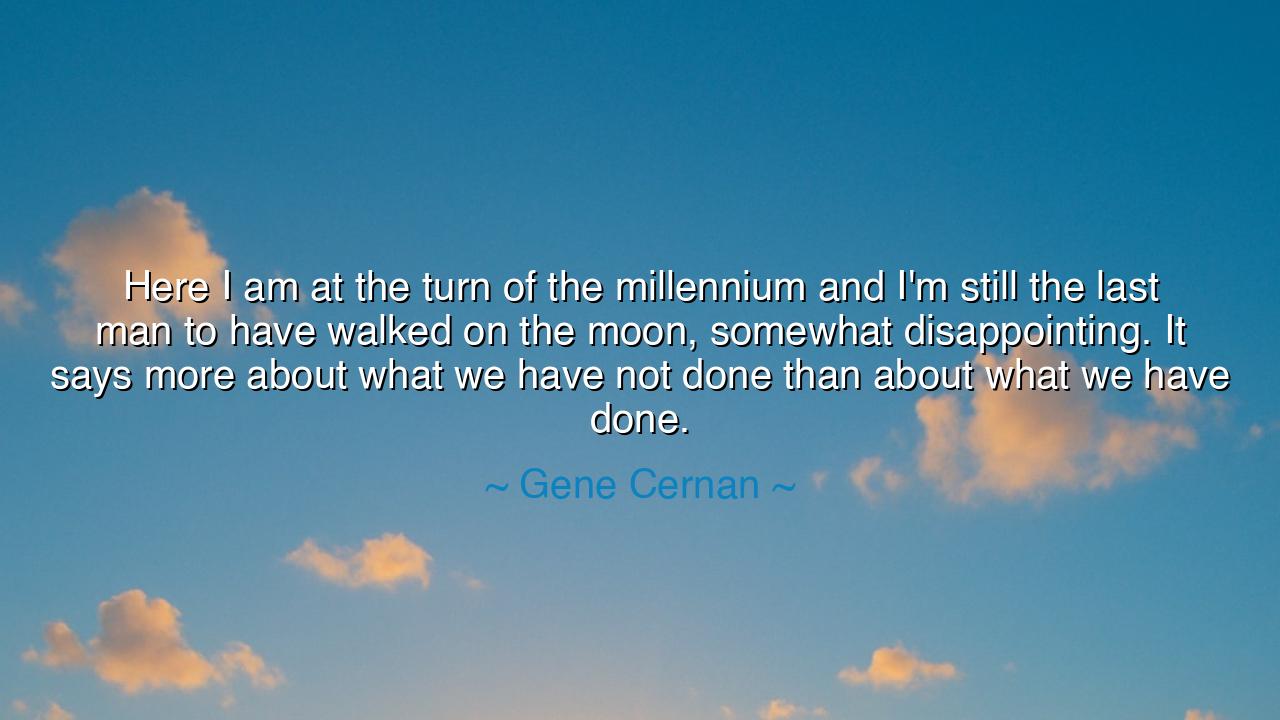
Here I am at the turn of the millennium and I'm still the last
Here I am at the turn of the millennium and I'm still the last man to have walked on the moon, somewhat disappointing. It says more about what we have not done than about what we have done.






“Here I am at the turn of the millennium and I’m still the last man to have walked on the Moon, somewhat disappointing. It says more about what we have not done than about what we have done.” So spoke Gene Cernan, commander of Apollo 17, the last of the moon voyagers, as he looked upon a world that had forgotten how to dream as greatly as it once did. His words are not of pride, but of sorrow — not a boast of what was achieved, but a lament for what was left undone. In his voice, one hears the echo of civilizations that once reached for the heavens, only to settle again into the dust of complacency.
Cernan’s reflection reveals the paradox of human achievement: that our greatest triumphs can also become our greatest shames when they are not surpassed. The Apollo missions were the songs of an age when humanity dared to rise above the Earth, to place footprints upon the silver face of the Moon. In 1972, when Gene Cernan turned and took his final steps across that silent plain, he left behind both an immortal mark and a haunting question: Why have we not returned? His words, spoken nearly three decades later, were not a celebration of legacy, but an indictment of stagnation — a reminder that progress, once halted, becomes regression in disguise.
To the ancients, this would not have been surprising. They knew that the soul of man thrives only when it strives. When Alexander had conquered the known world, he wept — not for joy, but for the lack of worlds left to conquer. When Rome ceased to expand, it began to decay. When nations stop reaching beyond themselves, their vision turns inward and their greatness wanes. Thus, Cernan’s lament is not only about space, but about the spirit of exploration itself, which dwindles when comfort triumphs over curiosity.
Consider the contrast between two ages: the fiery decade of the 1960s, when rockets soared, and the decades that followed, when they did not. In the first, humanity was united in purpose, gazing skyward; in the latter, it grew content to gaze at screens. The tragedy, as Cernan saw it, was not that the Moon had been conquered, but that the will to go further had faded. He looked upon a civilization capable of infinite discovery, yet content with the memory of a single triumph. “It says more about what we have not done,” he said — for what greater sorrow can there be than potential unfulfilled?
Yet his words are also a call, a summons to awaken. For in every age there comes a moment when humanity must remember what it once was — daring, unafraid, reaching into the unknown. The Moon, that ancient mirror in the sky, still waits, patient and pale, as if to ask whether we have lost the courage to come again. Cernan’s message is not merely for scientists and explorers, but for all who dream: do not let your past victories become monuments to idleness. The greatest dishonor to achievement is the failure to build upon it.
In our own lives, too, the same truth applies. We each have our “Moon” — the great moment when we reached beyond ourselves and touched the impossible. But too often we rest upon that memory instead of seeking new heights. We speak of what we have done, but not of what remains undone. To live wisely is to keep the fire of discovery alive — to let every success become a stepping stone, not a resting place. For stagnation, whether of nations or of souls, is a quiet death, and progress, though costly, is the breath of life.
So let this be the lesson of Gene Cernan, the last to walk upon the Moon: do not wait for another to take the next step. Whether in science, in art, in spirit, or in love, be among those who continue the journey. Refuse to be satisfied with yesterday’s triumphs. Ask always what more may be done — not from pride, but from purpose. For the measure of humanity is not in the footprints we have left, but in the courage to leave new ones.
And if one day, as Cernan hoped, another stands upon that distant surface and looks back toward Earth, let them say: We remembered. We rose again. We did not stop at the last step, but made it the first of many. For that is how history moves — not by those who rest upon the past, but by those who dare to surpass it.






AAdministratorAdministrator
Welcome, honored guests. Please leave a comment, we will respond soon